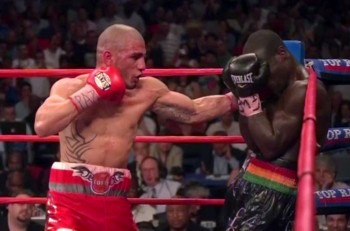 By Michael Herron: Competition is a part of life. Every moment of our lives can be described as a competition amongst our fellow man for advancement, security, survival. As naturally competitive beings our attraction to sports and athletics is strong, it is one of the few places where the moment can play out before our eyes and whether it is the Superbowl, the NBA Finals, the World Series, or a 40 yard dash, we are engaged and vested in victory. In most sports, the question of who emerges victorious is clear even when competition is close, but only in boxing is a close decision often deemed a controversial decision.
By Michael Herron: Competition is a part of life. Every moment of our lives can be described as a competition amongst our fellow man for advancement, security, survival. As naturally competitive beings our attraction to sports and athletics is strong, it is one of the few places where the moment can play out before our eyes and whether it is the Superbowl, the NBA Finals, the World Series, or a 40 yard dash, we are engaged and vested in victory. In most sports, the question of who emerges victorious is clear even when competition is close, but only in boxing is a close decision often deemed a controversial decision.
Before scrutinizing the sport of boxing and its history of controversial decisions, it is important to understand how other sports resolve a close contest. The word close in fact is a descriptor of every major sporting event: a close game, a close race, or as we say in boxing, a close fight.. In baseball, if a game is even, you go to extra innings until that final point and third out is secure. In football, a field goal will often settle a tied game. In track and field, a close race is settled by reviewing who crossed the finish line first. In golf only one stroke is needed to declare victory in a close game. In these sports, regardless of how tight the competition, the eventual winner often emerges without doubt…without controversy. Boxing on the other hand, which could very well be among the most ancient of human sports, has yet to come up with a scoring system, amateur or professional, that yields a genuine victor every time, or enough of the time. Simply put, when it comes to close decisions in boxing, too often observers feel the wrong fighter won.
The weekend battle between welterweights Miguel Cotto and Joshua Clottey serves as a perfect platform for discussing competition and controversy. What is fascinating is not that this match is greater or more remarkable than any other questionable decision of the past but that everyone in the boxing industry, including fans, writers, commentators, and reporters, freely acknowledged that if this fight went to a decision, Cotto, even in apparent defeat, was likely to receive the win. Additionally, further analysis of Cotto’s victory and explanations for Clottey’s defeat fits and wears every boxing cliché’ like a glove. For instance, those who agree Cotto won have used several clichéd phrases in explaining the victory, “did not do enough to win,” “gave away the last rounds,” “wanted it more,” “proved he is a true warrior,” “it was boxing not running,” or the reverse “it was running not boxing.” The point is, in every fight where there is a popular fighter, fighting for a home crowd, with network backing, and with a big money fight in the future, even if he appears to have lost a close fight he nevertheless gets the win. Even more mind-boggling is that the opponents are typically said to have lost for the same reasons—giving away the final rounds or not doing enough to win. Is this a convenient cliché’ or does every fighter in the universe about to pull an upset coincidently gives away the last rounds?
Furthermore, the boxing industry also refers to close and controversial decisions with catchphrases such as “too tough to call,” “highway robbery” or if in agreement with the decision “can’t call it highway robbery.” The phrases are generally used to show support and/or disagreement; however they are also used to conveniently and easily explain away any argument or protest that a slighted fighter may have. “Too tough to call” for example, is often paired with the statement “the fight could of went either way” but if this were true statistics would show that in close fights that supposedly could go either way, scorecards would not be overwhelmingly in favor of the hometown fighter, the champion, or the network preference.
Boxing, like no other sport, is plagued with poor decisions, ahem, controversial decisions that continue to turn away not only fans but networks and sponsors from the sport. Confined to subscription cable and Pay-Per-View events, the sport has long ago traded in merit for money. Dollars and cents is without question the leading cause and reason for questionable decisions and promoters, networks, venues and voracious fans are unwilling to see their “cash cow” knocked off, especially in non Pay-Per-View events.
Finally, the phrase “black eye for boxing” has become cliché’ however it is so synonymous with the sport that restoring boxing to its glory days seems almost impossible. But perhaps boxing can help itself by simply recognizing the next time there is a close fight, that is too tough to call, and can go either way, let the judges decision, if not a draw, at last go to the fighter who earned victory not received it.
Send questions/comments to: mighty_mike7@att.net